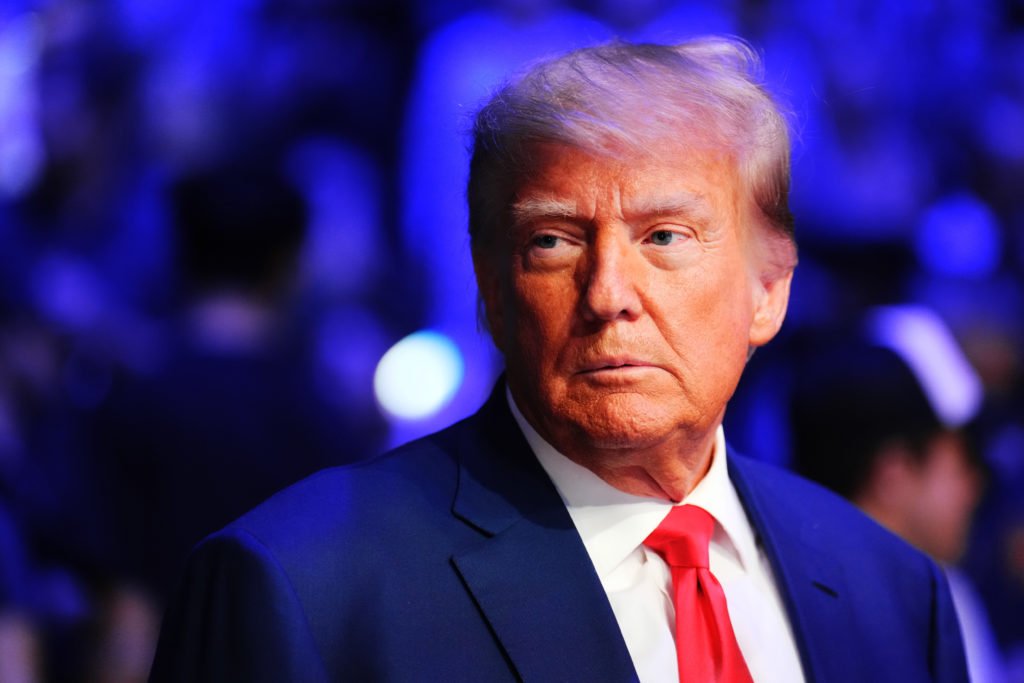
Trump’s World COLLAPSES After His SCHEME is EXPOSED!!
The MAGA movement’s obsession with “toughness” is unraveling. From homoerotic imagery to cultish groupthink and policies that harm working Americans, Trump’s empire of toxic masculinity is collapsing under its own hypocrisy.
How toxic masculinity shapes the MAGA movement and Republican Party—masking insecurity, fueling cult-like devotion, and steering American politics through contradiction and performative machismo. Contradictions and bizarre theatrics of toxic masculinity in the MAGA movement, from odd photo ops to cultish devotion, and how these behaviors shape public policy and political discourse in America.
Picture this: a senator doing a couple’s photo shoot with a football star while his party rails against anything ‘unmanly’—that’s just another Tuesday in MAGA land. Let’s dig into the peculiar world where strongman posturing, pop-culture photo filters, and denial of empathy shape not just political rhetoric but actual policy. Ever wonder what happens when the loudest men in the room build their platform on contradictions? Yeah, me too.
Toxic Masculinity: The Cult of Toughness and Its Strange Flexes
In the world of MAGA Masculinity, the obsession with “toughness” is not just a talking point—it’s a full-blown cultural performance. The Republican Party, especially under Donald Trump’s leadership, has built a brand around the idea that “good, strong men” are the backbone of America. This rhetoric is everywhere, from campaign speeches to viral social media posts, and it’s often used as a weapon against political opponents. Senator Josh Hawley summed it up on Fox News:
‘They blame men for everything…this country needs good, strong men.’
But what does this “tough guy mindset” really look like in practice? And why does it so often seem to contradict itself?
Obsessive Rhetoric: The Myth of the Strong Man
MAGA followers and Republican leaders frequently invoke the image of men who “swing a hammer,” “fight our wars,” and “build our cities.” This language isn’t accidental—it’s a deliberate appeal to traditional machismo and a rejection of anything seen as soft or feminine. The message is clear: real men are tough, and anyone who doesn’t fit this mold is suspect.
Research shows that this kind of toxic masculinity is linked to a macho, authoritarian mindset. It suppresses emotional sensitivity and empathy, and it’s used to rally the base by drawing a sharp line between “us” and “them.” The Republican Party often frames Democrats as hostile to “real men,” amplifying insecurity among their supporters and reinforcing rigid gender norms.
Strange Flexes: The Visual Culture of MAGA Masculinity
If you scroll through MAGA social media, you’ll quickly notice an odd trend: Donald Trump photoshopped as Superman, a pope, or some other hyper-masculine icon. These images are everywhere, often shared by official accounts and right-wing influencers. The irony is hard to miss. Trump, who is frequently mocked for his orange makeup and flamboyant style, is recast as the ultimate tough guy—sometimes even in poses that border on homoerotic.
This visual culture highlights the contradictions at the heart of MAGA masculinity. On one hand, there’s an obsession with projecting strength and dominance. On the other, the imagery often feels more like fan fiction than genuine displays of machismo. As one commentator put it, “The most photoshopped queen I have ever seen in my life is the president of the United States, convicted felon Donald Trump.”
Personal Examples: Awkward Displays and Homoerotic Undertones
The performance of toughness doesn’t stop at memes. Republican politicians like Senator Josh Hawley have gone viral for their own strange flexes. Take, for example, the engagement-style photo shoot with Kansas City Chiefs kicker Harrison Butker. The images, which look more like a wedding announcement than a political statement, have been widely mocked for their unintentionally homoerotic undertones.
These moments reveal a deeper paradox. While MAGA masculinity is all about rejecting anything “soft” or “feminine,” it often ends up embracing flamboyant or coded behaviors that clash with its own rhetoric. This isn’t just a quirk—it’s a core feature of the movement’s visual and cultural language.
Projection and Insecurity: The Attack on “Democrat Men”
A key part of the tough guy mindset is the constant need to define masculinity by what it is not. MAGA followers and Republican leaders frequently describe “Democrat men” as weak, lazy, or effeminate. This isn’t just political trash talk—it’s a form of projection that reveals deep-seated male insecurity within the movement.
Studies indicate that Republican male supporters are more likely to feel threatened by changing gender roles and to believe that society is “too soft.” This insecurity fuels the need for ever-more extreme displays of machismo, even as those displays often veer into self-parody.
The Political Impact of Toxic Masculinity
Toxic masculinity in MAGA culture has real-world consequences. It shapes public policy, encourages aggressive and sometimes violent behaviors, and drives the cult-like loyalty that surrounds figures like Donald Trump. The January 6 Capitol attack, for example, was celebrated by Trump and his followers as a show of “strength”—even as it exposed the dangers of unchecked machismo and authoritarianism.
Ultimately, the cult of toughness in MAGA politics is less about genuine strength and more about performance. It’s a strange, often contradictory spectacle—one that reveals as much about male insecurity as it does about power.
From Cult Language to Cult Following: MAGA’s Odd Groupthink
The rise of the MAGA cult has brought with it a unique brand of groupthink, one that is easy to spot in both language and behavior. At the center of this movement is Donald Trump, whose simple, fifth-grade-level speech has become the blueprint for MAGA followers and much of the Republican Party. Linguists have repeatedly noted that Trump’s intentionally basic language isn’t just a quirk—it’s a strategy. By keeping things simple, he ensures his message is accessible and easily repeated. This is why phrases like “Democrat Party” (instead of “Democratic Party”) have become linguistic shibboleths, instantly signaling in-group loyalty among MAGA followers.
The mimicry goes well beyond language. MAGA supporters, from politicians to pundits, copy Trump’s mannerisms, talking points, and even his personal style. As one commentator put it:
‘We are such cult followers that we follow our leader who wears bright orange makeup… and we copy his speaking pattern.’
This cult-like adherence to Trump’s quirks and image is more than just fandom—it’s a powerful form of group identity. When MAGA followers parrot Trump’s speech or adopt his performative bravado, they are signaling loyalty to the group and its authoritarian influence. The effect is a kind of political cosplay, where everyone insists their version of masculinity or patriotism is the only real one. It’s as if the MAGA movement is a convention where the costume is “tough guy” posturing, and any deviation is met with suspicion or ridicule.
This fixation on performative masculinity is especially visible in MAGA rhetoric. Republican Party figures like Senator Josh Hawley often invoke the image of “good, strong men that swing a hammer,” framing masculinity as both under attack and essential to the nation’s survival. The irony, of course, is that these same leaders participate in photo shoots and social media campaigns that are heavily stylized—sometimes even homoerotic in their presentation of Trump as a muscular superhero or religious icon. The contradiction is striking: while MAGA followers rail against perceived “softness” or “femininity” in society, they simultaneously engage in elaborate displays that seem to undermine their own message.
Research shows that this obsession with a narrow, regressive view of masculinity is linked to deeper insecurities within the MAGA base. Many Republican men feel that society punishes them for traditional male traits, and MAGA rhetoric taps into these anxieties by projecting weakness onto political opponents. Democrats are accused of being lazy, godless, or unmanly, while MAGA supporters are cast as the last defenders of “real” America. This projection of weakness serves a dual purpose: it bonds the group through shared victimhood and distracts from internal contradictions.
The groupthink within the MAGA cult is further reinforced by a culture of “owning the libs.” Instead of engaging in nuanced debate, MAGA followers often resort to mocking language and performative outrage. The repetition of Trump’s talking points—no matter how simplistic or inaccurate—becomes a badge of loyalty. As a result, political discourse is reduced to slogans and memes, leaving little room for dissent or complexity.
This dynamic is not limited to language. MAGA’s groupthink extends to policy and governance. When Trump put his name on COVID relief checks, it was a calculated move to associate government aid with his personal brand, despite the Republican Party’s usual rhetoric about small government. Meanwhile, MAGA-aligned politicians like Ted Cruz prioritize foreign aid or culture war issues over basic services for their own constituents, even as disasters unfold at home. The disconnect between rhetoric and reality is glaring, but within the MAGA cult, loyalty to the leader trumps all else.
Ultimately, the MAGA cult’s odd groupthink is a product of authoritarian influence, male insecurity, and a relentless drive for in-group conformity. By lowering the bar for political discourse and rewarding fealty over independent thought, the movement enables the rapid spread of anti-democratic ideas. The result is a political culture where language, identity, and even reality itself are shaped by the whims of a single leader—and where questioning the script is the only real taboo.
The Disconnect Between Rhetoric and Policy: Who Really Benefits?
The gap between what MAGA leaders say and what they actually do has never been more obvious than it is today. The Republican Party, under the influence of the MAGA cult and figures like Donald Trump, has built a narrative that Democrats disrespect “working men” and ignore the needs of everyday Americans. But when you look at the facts, the reality is far more complicated—and far less flattering for those making these claims.
Take, for example, the COVID stimulus checks. Donald Trump made a point of having his name printed on every check, turning a much-needed public policy response into a personal branding exercise. This was less about helping struggling families and more about creating the illusion that government aid was a gift from Trump himself. Research shows that such performative stunts are designed to win loyalty, not to solve real problems. The MAGA cult’s support for “working men” is often just that—support in name only, with the real benefits flowing elsewhere.
Meanwhile, the Republican Party has been quietly dismantling the very government services that working families depend on. The National Weather Service, for instance, has faced deep cuts, leaving communities vulnerable during disasters. When Texas was struck by devastating floods, many wondered why there was no timely warning. The answer? Staffing shortages and budget cuts, the direct result of MAGA-led downsizing. As one observer put it,
‘You would think Ted Cruz… would just be in DC fighting like hell to make sure the National Weather Service was funded.’
Instead, Senator Cruz was busy pushing for an additional $250 billion in aid to Israel, even as his own constituents struggled to recover.
This redirection of resources is not an isolated incident. It’s part of a broader pattern where MAGA leaders use the power of government to serve their own interests or those of their allies, often at the expense of ordinary Americans. While public policy should be about serving the public good, what we see instead is a system rigged to benefit the wealthy and the politically connected. Studies indicate that toxic masculinity, so often celebrated in MAGA circles, directly shapes these policies—funneling benefits toward insiders while leaving those in genuine need behind.
The hypocrisy doesn’t end there. MAGA talking heads on Fox News rail against “lazy” Democrats who supposedly live off government handouts, yet the Trump administration was quick to take credit for government relief when it suited their narrative. The message is clear: government is bad, except when it can be used for personal or political gain. This double standard is a hallmark of political corruption, and it undermines trust in public institutions.
Perhaps the most blatant example of this disconnect is the pattern of apparent insider trading and online corruption surrounding Trump’s tariff announcements. As documented by market observers, there have been suspiciously timed trades just before major policy moves—moves that benefit a select few while ordinary citizens bear the cost. Trump himself has even bragged about how people close to him have profited from these decisions, further exposing the self-serving nature of the MAGA movement.
At its core, the MAGA cult’s performative support for “working men” is a smokescreen. The real beneficiaries of their policies are not the men and women who swing hammers or drive combines, but those with access, wealth, and political power. The rhetoric of strength, masculinity, and patriotism is used to distract from a reality where public policy is shaped by toxic masculinity and a relentless drive to reward insiders.
In the end, the disconnect between what MAGA leaders say and what they do could not be starker. The Republican Party’s embrace of performative populism and political corruption has left ordinary Americans behind, even as its leaders claim to champion their cause. Until this gap is closed, the promise of government “for the people” will remain just that—a promise, unfulfilled and increasingly out of reach.
TL;DR: The MAGA movement’s loudest champions of ‘traditional masculinity’ are often caught in contradictions, from homoerotic imagery to cultish language, pushing policies that serve a select few while masking insecurity and political misdirection.
ToxicMasculinity, MAGAMasculinity, AmericanPolitics, RepublicanParty, MaleInsecurity, TraditionalGenderNorms, DonaldTrump, MAGACult, AuthoritarianInfluence, PublicPolicy,Trumpmasculinitycult, MAGAgroupthinkbehavior, PamBondiEpsteinscandal, Republicanhypocrisypolicy, performativepopulism
#ToxicMasculinity, #MAGA, #AmericanPolitics, #RepublicanParty, #MaleInsecurity, #DonaldTrump, #CultureWars, #PublicPolicy, #PoliticalCorruption, #Trending,#ToxicMasculinity, #MAGACult, #TrumpCollapse, #RepublicanHypocrisy, #EpsteinScandal, #PamBondi, #MAGAGroupthink, #Populism, #FoxNews, #ElonMusk

